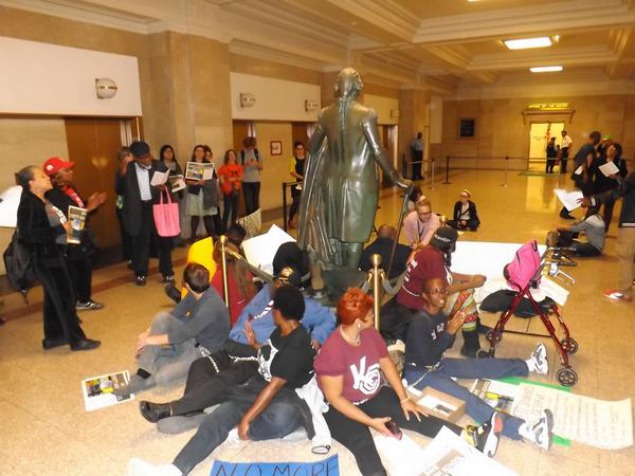The Hunger Strike Over Dyett High School Has Lasted A Month
By Kate Shepherd in News on Sep 16, 2015 5:11PM

Activists staging a sit-in at City Hall last year to save Dyett High School. (Photo via Twitter, courtesy of @fairtrade_ervin)
With their hunger strike now a month long, activists fighting for their vision of the future of Dyett High School say that the struggle is not over yet.
Four strikers had to stop fasting Tuesday because of health concerns but a few new people have joined the protest.
"We are looking for, hoping for a conversation with the district," Jitu Brown, hunger striker and education organizer for the Kenwood Oakland Community Organization, told Chicagoist. "We want the demands we laid out met so we can move forward."
Earlier this month, Chicago Public Schools announced it would reopen the school as an open-enrollment arts school and "community innovation lab" next year. While some have called the proposal a "compromise," officials drew criticism for announced their plan without allowing the hunger strikers into the news conference, and community activists want a technology high school.
Brown said he asked schools CEO Forrest Claypool to continue negotiations when they were informed of the announcement just 15 minutes before it took place, but Claypool only responded, "We're moving forward."
"A compromise happens when two people come together and they work out together something that's agreeable to both parties," Brown said. "There was no compromise."
The strikers want a high school focused on technology in their neighborhood because of the field's high employment rate relative to fields in the arts.
Despite Chicago Public Schools' and the city's budget woes, Lincoln Elementary School in Lincoln Park just unveiled its new $20 million addition. Spending disparities like that show that inequity is the problem with public education, not bad teachers, Brown said.
"This hunger strike shows that in America the problem in public education is not that we have failing schools but we have been failed by the system we trusted," he said.
Though Cathy Dale, one of the 15 activists who have gone without solid food for 30 days, said she was ready to die, she ended her hunger strike Tuesday because of heart palpitations at the advice of her doctors. In addition to Dale, Jeanette Taylor-Ramann also had to end hers due to dangerously high blood pressure, Nelson Sosa ended his due to exhaustion and Dr. Aisha Wade-Bey, who is a teacher, ended hers in order to continue teaching to the best of her ability.
Even though they've lost a few strikers to health concerns, some new people have joined the strike in solidarity, according to Brown.
And he hopes the hunger strike, which has gotten national media attention, has raised the public's awareness of public education issues.
"We hope that this hunger strike has helped to raised consciousness," he said. "We hope that it's had an impact but it's not complete yet."
The strikers received a wide variety of support this week, from former mayoral candidate Jesus "Chuy" Garcia and a group of aldermen to a group of nurses and two prominent black-owned newspapers. According to the Tribune, Garcia said that he hoped the mayor would at least give the strikers the dialogue and input they've been demanding.
"I am very optimistic that can happen, and it will happen if the mayor decides this is going to be a different way of engaging communities in his second term," Garcia said.
Aaron Cynic contributed to this report.